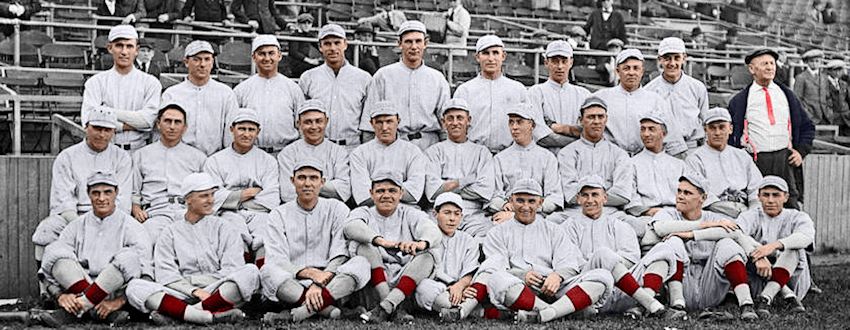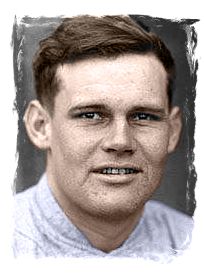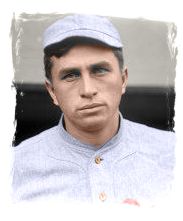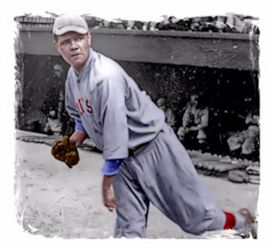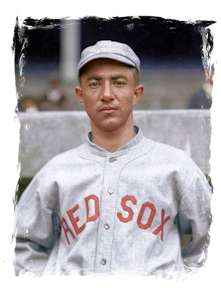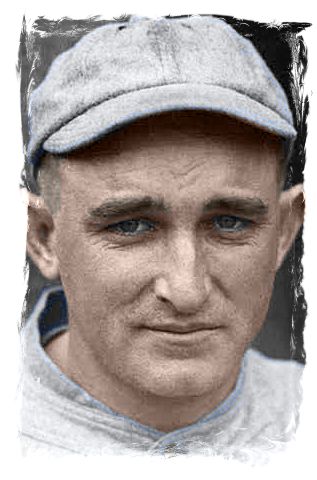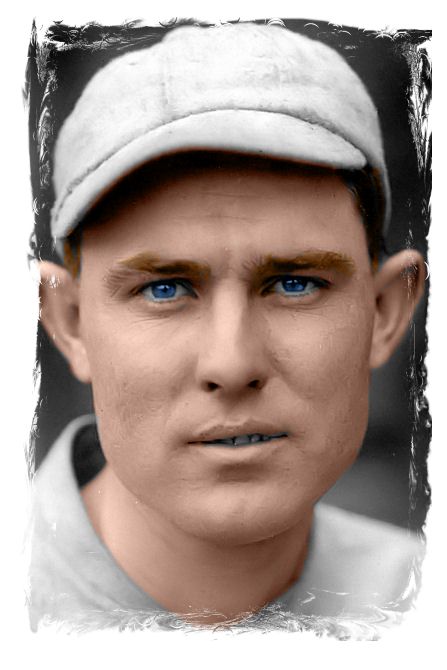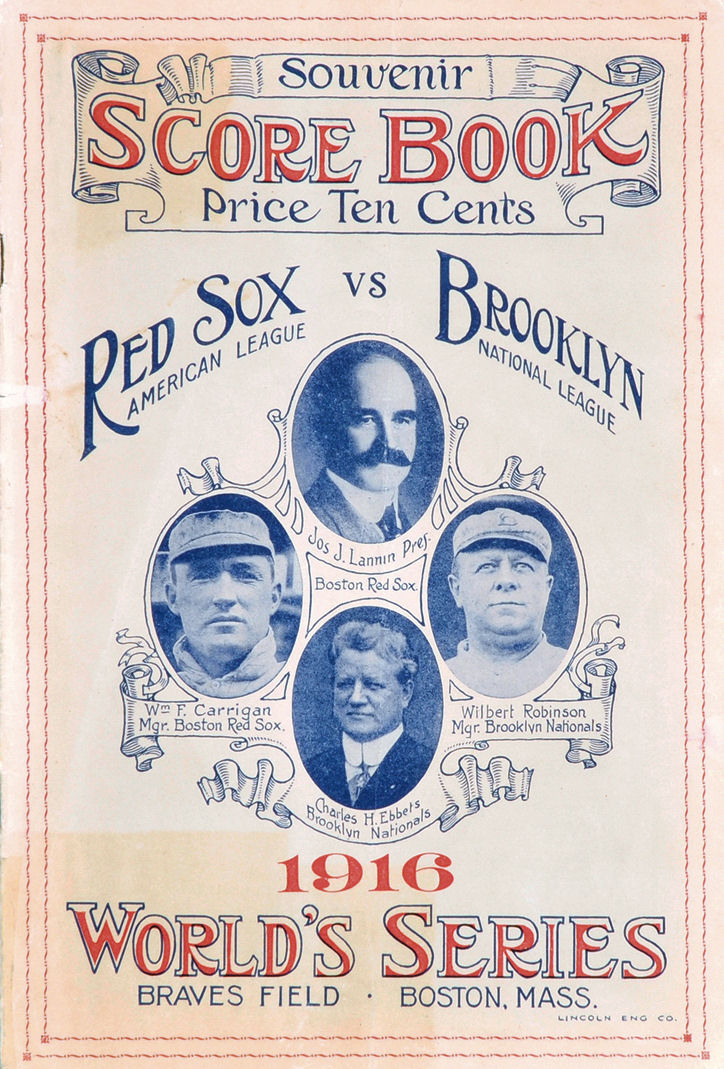|
1916 BOSTON RED SOX
Cutting prices was the name of the game early in 1916. Despite coming off a World Series win, Red Sox owner, Joe Lannin was in a position to cut salaries. The Federal League was defunct and with fewer major league bidders, there was no need to pay the artificially inflated salaries that had characterized 1914 and 1915. Many, if not most, player contracts were for lower amounts than the year before. As the club gathered for Spring Training, they looked even stronger than the year before. The young pitching staff had been tested and Bill Carrigan planned few changes. But Tris Speaker and Joe Wood were holdouts. Speaker wasn’t pleased with his salary being cut from $17K to $10K. Lannin argued that his production had steadily decreased, batting .383 in 1912, .365 in 1913, .338 in 1914, and .322 in 1915. Speaker refused to sign, but reported to camp. The greatest Red Sox player in their history was then sold, on the eve of the season opener, to the Cleveland Indians for $50,000 and pitcher Sam Jones and utility infielder Fred Thomas. Red Sox fans were outraged. Earlier, American League President Ban Johnson had brokered a deal for his crony, the former Baltimore Orioles owner Jim Dunn, who had sold Babe Ruth to Joe Lannin, to buy the Indians from Charles Somers. Johnson had even loaned Dunn a portion of the money, retaining some financial interest in the club. Johnson himself was the one who put together the deal to buy Speaker, before any of the other clubs knew that Speaker was available. With the purchase of Speaker, Johnson's investment in the Indians went up. There was evidence that Lannin was coerced by Johnson to make the deal, because their relationship cooled significantly after. Joe Wood received a similar offer. Lannin refused to pay for a sore-armed pitcher, based on what he had done when he was healthy. Unlike Speaker, Wood stayed home on his farm in Pennsylvania. Duffy Lewis slumped to .268 in 1916, but on his return to the World Series, he hit .353 (6-for-17). Everett Scott improved his batting average to .232, as well as being the American League leader in fielding average for shortstops. But the Red Sox still had a great pitching staff and in the "Dead Ball Era" that was enough. No team in the American League could match the Sox pitching staff. Carl Mays and Babe Ruth emerged, while stars like Dutch Leonard, Ernie Shore, and George "Rube" Foster continued to put up their strong numbers. Mays split his time between the rotation (24 starts) and bullpen (20 other appearances), going 18-5 and posting a 2.39 ERA. Leonard went 18-12 and because his strikeout rate continued to fall, he was no longer considered one of the game’s overpowering pitchers, Dutch did pitch a no-hitter, a 4-0 shutout over the St. Louis Browns. Ernie Shore had another decent season. He finished at 15-10 with a 1.82 ERA in 34 2/3 innings pitched. George Foster threw the first no-hitter ever thrown in a Red Sox game at Fenway Park, beating the Yankees, 2-0. The feat earned him a $100 bonus from Joe Lannin. Foster was 14-7 (3.06) for the season, with only three shutouts. He had missed time near the end of the season due to a lame arm, from which he had suffered about half way through the year. Four days after the World Series ended, Foster retired. At age 21, Babe Ruth was arguably the best left-hander in baseball. Compiling a 23-13 record for the season, he ranked third in the American League in wins, innings (323 2/3), and strikeouts (170), while setting a league record for left-handers with nine shutouts, that still stands. Only Chicago's Eddie Cicotte bettered Babe's .657 winning percentage, and Ruth's league-best 1.75 ERA has not been topped by a Red Sox pitcher since. He held opponents to a .201 batting average (also the lowest mark in the league) and when at the plate himself batted .272 including 19 pinch-hitting appearances. Lannin also picked up veteran Tilly Walker from St. Louis, to replace Speaker, and although he played well, wasn't the player Speaker was
Taking the ball on opening day, Babe won 2-1 against the Athletics at Fenway Park on April 12th. He held the visitors to four hits, two for unproductive doubles. The next day was another win, this one by an 8-2 score. Ernie Shore got the A's out in order for the first five innings and finally gave up a pair of runs in the sixth. The Sox made it three straight in on April 15th, winning 2-1 behind George Foster. Joe Bush pitched for Philly, but after holding a 1-0 lead until the fifth inning, he was hit for the tying run by Foster, who knocked in Jack Barry. Later, in the eighth inning, Everett Scott doubled to left. Dick Hoblitzell ran for him and was driven home by Chick Shorten with the eventual winning run. Washington next came to Boston and the Sox made it four straight with a 5-1 victory on April 17th. The Sox banged Walter Johnson for 11 hits in six innings. Johnson served up a pair of doubles in the first inning to Scott and Hoblitzell. The combination gave the Sox a one run lead which they held until the sixth inning, when the Sox hit Johnson for four more runs. Babe Ruth pitched very well until the eighth inning, when the ball got wet and the game was called. The Nats took the next two games, but in the second game of the Patriot's Day doubleheader on April 19th, Dutch Leonard shut them out, 2 to 0. Leonard made his starting debut by holding Washington to just three scattered hits. He only let a runner reach third base once, and second base just three times, all without doing any damage. Larry Gardner was the hitting star for the day with two singles and a triple, while Harry Hooper had three singles. The Sox next took the train to Philadelphia and beat the A's, 7-1, on April 20th. From that time to the end, Philly was never in the game and got their lone run in the fifth inning, when Babe Ruth passed a man and gave up two singles. That was the only inning that Philly got more than one hit off Babe. The A's won the next two games but the Sox managed to earn a series split by winning the final game, 4-0 on April 24th. The Sox did not produce any more hits than Philly, but they were timely. Dutch Leonard had great control, not issuing a pass until the last inning. He kept the hits well scattered, which prevented him from getting into tight places. At the Polo Grounds in New York, the Sox gave the Yankees a heartbreaking loss, winning in extra innings 4 to 3 on April 25th. Only five Yankees were able to hit the "Babe" who pitched a great game, and if not for an error the score would not have been tied and gone into extra innings. In the 10th Olaf Henriksen singled, was sacrificed by Hal Janvrin, and driven in by Hoblitzell. The Yankees made a dying effort in their half of the 10th. With two out Roy Hartzell got on base and got thrown out trying to steal second base, ending the game. The Sox were shut-out in the next game but bounded back to take another extra inning thriller on April 28th, 3 to 2 in 11 innings. Apparently shut out 2 to 0, when they went to bat in the ninth inning, Duffy Lewis smashed the ball into the left field bleachers and trotted around the bases behind Hoblitzell, who scored ahead oh him and the game was tied. In the eleventh the Sox started a winning rally when Hooper waited until he drew a pass. Hobby smashed one to right for a double and Hooper went to third. Lewis hit a hot grounder that Roger Peckinpaugh had trouble picking up, and the best Peck could do was get Duffy at first, letting Hooper come in with the go-ahead game winning run.
The Red Sox into first place by 1/2 game, but the loss of Tris Speaker hurt them and the club suddenly dropped into a horrendous batting slump, losing three in Washington and falling into fourth place as May started. Coming back to Fenway, the slump continued as the Yankees took 3 of 4. The only win was the series opener on May 4th. Dutch Leonard kept the Yanks down to just two hits and a total of three bases. Only two Yanks reached second base and only four reached first. He passed only two men and struck out two, winning 3-0.
Next was the split of a four game series with Cleveland at Fenway Park as Tris Speaker came back to town with the Indians. Leonard (4-0, 0.41 ERA) again pitched a great game, winning 5-1 on May 9th. Three hits were all the Indians could muster off Dutch. The Sox knocked out six hit, three of which were doubles, while Cleveland made four errors, all that cost them. The other win of the series came in the third match-up on May 11th. It took 10 innings and the Sox got some lucky breaks and ended up beating the Indians by a score of 6 to 5. In the 10th inning Dick Hoblitzell was at third base and Jack Barry at the plate. Down two strikes, Barry lifted a foul pop to the third base side of home plate. With two outs, Hobby came running down the line as the wind started pushing the ball toward fair territory. The ball fell safely just inside the line as Hobby scored the winning run. The Red Sox won another ten inning game two days later against the White Sox, 3 to 2. Larry Gardner came up in the 10th inning with the bases loaded and one out, to deliver the victory for the Red Sox. Hal Janvrin started it off with a base hit. Hobby reached after being hit by a pitch, and Duffy Lewis beat a slow tapper to load the bases in front of Gardner's walk-off hit. Against the St. Louis Browns, the Sox could only score one run in each of the first two games and lost both of them and gave up a total of 12 runs. Then on May 20th, the Sox won the game 3 to 1, because St. Louis pitchers issued them multiple free passes. Having gone 4-9 thus far in May, the Sox had fallen six games off the pace in the American League. The Sox then took three straight from the last place Tigers. On May 22nd, the Red Sox won the game, 2-1 with two outs in the ninth inning. It fell to Hal Janvrin coming through with a clutch hit and Tilly Walker, who had started the inning with a double, galloping home with the walk-off run. But the Sox had left fourteen men on base.
In the next game, on May 24th, the Red Sox beat the Tigers 4 to 0. Babe Ruth pitched a great game, allowing four scattered hits, and walking three. Harry Hooper pulled off some of the best catches ever seen at Fenway. One came in the seventh inning, when he ran straight back to the fence and pulled the ball off out of the stands. In the same inning he made another great running catch, racing toward the foul line at full speed and diving straight out. And not to be outdone in the field, Hooper smashed out a triple and a double, driving in two runs. Ernie Shore pitched splendid ball against the Tigers in the final game, winning 5-2. The Sox then took off to New York and lost three straight to the Yankees. The first two were close games in a doubleheader, each lost by one run in the last inning, 2 to 1 and then 6 to 5. In the fourth game, on May 29th, the Sox shut out the Yankees 3 to 0. They played like a machine and made no mistakes. Carl Mays' pitching was flawless. Pinch Thomas homered into the right field stands, in the first inning, and then in the fifth inning he slammed a double to left, reached third on an infield hit and came home on a sacrifice fly. An important four game series was next with the first place Washington Nationals, who were six games ahead of the Sox. First, a doubleheader on May 30th, was swept by the Red Sox. The Sox won behind Ernie Shore in the morning, and late in the game George Foster came in to close out the game and got out of trouble twice. Foster saved the day by starting a doubleplay with the bases full in the eighth, and in the ninth, got out of a bad situation with the tying run sitting on third base and the bases loaded. The Sox made 11 hits, six of which were doubles, and won 4 to 3. The afternoon game was won, 8 to 2. Dutch Leonard went the distance and came close to having a shutout, but for a couple of Texas League base hits. Dutch gave up seven scattered hits except in the sixth inning when he was hit for two runs. The third game was a total blow-out by the Sox. They smacked out 11 hits, winning 10-1. Tilly Walker was the hitting star, putting out two doubles, a triple and a single. Mike McNally had a hot bat, chipping in with three singles and Larry Gardner had a triple with two men on base highlighting the Sox slugfest.
The final game was a close scoreless pitcher's duel between Babe Ruth and Walter Johnson on June 1st. Mike McNally won the game, scoring from second base in the eighth inning. McNally had been the star over the last couple of games, and came up in the eighth inning with one out. He went after the first pitch from Johnson and smashed it over second base into right field, running along to second base on an infield hit by Duffy Lewis. Dick Hoblitzell then hit a perfect doubleplay ball to George McBride, the shortstop. He tossed it over to Ray Morgan forcing Duffy at second and then, instead of going to first to complete the twin killing, went after McNally, who was rounding third and heading home. Morgan hesitated and fired to the catcher, but McNally slid in under the throw and the Sox had broken the stalemate. The final score was 1 to 0 and was one of the best played games of the year, making it four straight wins over the first place Nats and cutting their lead to 2 1/2 games over the Sox. The Sox next embarked on a not too successful road trip out west. The first stop in Cleveland produced only one win in three games. That was a 5-0 shutout by Babe Ruth. He threw another shutout on June 5th. Babe held the Indians to six hits with only two runners getting as far as third base. He kept the hits scattered, passing only one man. In Detroit, the Sox played two games and lost them both. Babe got knocked out in his next start against on June 9th, but was perfect at the plate and hit his first home run, since last July.
In St. Louis they split a four game set. The Sox first win on June 10th was a thrilling 4-2 win in 10 innings. Everett Scott sent a screaming line drive to left, driving in the two runners, who would be the game winners. Dutch Leonard went along, holding a 1-0 lead until the eighth inning, when a single, double, and a triple put the Browns ahead 2-1. In five of the eight innings he pitched, Dutch gave up a lead-off hit, putting him in a hole. Doubleplays in the fourth and sixth got him out of trouble however. Babe homered again (a three-run shot) when Bill Carrigan called on him to pinch-hit on July 12th, in St. Louis. The second win was by a 5 to 3 score on June 13th. Babe pitched, faltered and was wild. He passed six batters but only allowed four hits. But the Babe's bat again responded to the Browns' pitching. He was first up in the third inning, looked over a couple of pitches and then clouted one of Dave Davenport's fast balls into the right field bleachers. It was his third home run in the last four games. Babe Ruth’s home-run production was down. That would be his last home run of the season, but that was still enough to lead the team in the middle of the “Deadball Era”. The trip saw the Sox split another for game series in Chicago. The Red Sox unloaded four hits in the ninth inning of the first match-up, to come from behind and beat the White Sox 2 to 1. It was a great finish and Dutch Leonard, who really pitched a great game, made the hit that sent Hal Janvrin over with the winning run. The other win was a 3-1 decision on June 18th. With the bases loaded in the ninth inning, Leonard made Eddie Collins pop-up to Hal Janvrin and the Red Sox won the game. Dutch came in as the closer, relieving Carl Mays with one out in the ninth and he was cool and efficient, earning his first save of the season. Well placed hits by Larry Gardner and Hal Janvrin in the fifth and seventh innings, put the runs over that won the game. The Sox finished the trip, winning only five of their thirteen games. Red Sox fans were horrified as Tris Speaker and the Cleveland Indians vaulted into first place. The Sox came back to Boston behind first place Cleveland by five games and 1 1/2 games behind the Yankees, who were the first opponent they faced at Fenway. The master motivator, Carrigan didn't let his team give up. Even without Speaker the team began to respond to him.
Their first game back home was a loss to the Yankees on June 20th. Tillie Walker, the man who’d taken Speaker’s place in center field, hit a homer over the left field wall, in that game. That home run was the only one the Sox would hit at Fenway Park all season. That game was also the one that Everett Scott began his “iron-man” streak of 1,307 consecutive games played, which would last until it was broken by Lou Gehrig.
Then the Sox next came alive with three straight shutouts.
Babe Ruth
Now the Philadelphia Athletics came to play the Sox at Fenway.
A doubleheader was played the next day and the Sox took both games. The Sox had a field day an won by the two scores of 3 to 2 and 7 to 3, with Carl Mays taking credit for the two wins The first game was presented to the Sox in the ninth inning. Philly was ahead 2-1 in the ninth inning with one out and Hooper and Janvrin on second and third, when Hoblitzell hit an easy fly ball to Wally Schang in left for the second out. Hooper tagged up and scored the tying run when Schang's throw was dropped by the rookie catcher, Mike Murphy. Murphy then let Nabor's next pitch slip threw his hands, allowing Janvrin to come across with the winning run. Dutch Leonard started the game and Mays finished the game, watching as Murphy's miscues gave him a win. The second game the Red Sox won 7 to 3 with Mays, who started the game, getting his second win of the day. The A's won the next game but the Sox bounced right back to take the last game on June 27th. Larry Gardner had a nice day at bat, collecting three singles, with two RBIs, and the Sox romped home with a 7 to 2 win. On the road again, as June ended and July began, the Sox lost 3 of 4 in Washington. In the only win, Carl Mays was again the winning pitcher. Two hits was all that he allowed the Nats in the Sox 6 to 1 win.
Three straight easy wins were next enjoyed by the Sox in Philadelphia to start July before coming back home, with Shore, Leonard and Mays getting the victories. The Sox were in 4th place, 3 1/2 games behind the Yankees and 2 1/2 games behind the Indians. Two of three wins against Tris Speaker and the Indians happened first at Fenway. First, on July 6th, in a strongly contested game, the Red Sox delivered the winning run with two down in the last inning, by a score of 6 to 5. Everett Scott opened the ninth with a single and went to second on a ground out. Hooper was intentionally passed before Jack Barry hit a vicious line drive over leftfielder Jack Graney's head at the top of the cliff for the walk-off win. In the next game, the Red Sox beat the Indians by a 3 to 1 score. The visitors jumped on Babe Ruth in the first inning, scoring their only run. After that, Babe pitched a fine game until Mays came in to relieve him in the eighth and got another win. The Sox tied the score in the seventh inning and scored the winning run in the eighth, with Tilly Walker getting the satisfaction of sending Jack Barry home with a line drive single to center. The Sox then lost three straight. They were shutout twice by the White Sox in a doubleheader and then swept them in another doubleheader the next day, on July 11th. The Red Sox took an early lead in both games. They jumped out to a quick lead, but the White Sox came back to tie the game in the third inning. The Red Sox scored four runs in their bottom half of that inning and never looked back, winning 5-3. In the second game, the Red Sox scored single runs in the fourth and fifth innings, to take the lead and held it behind the pitching of Babe Ruth, winning 3-1. Another doubleheader, the next day, on July 12th, saw both games go into the Red Sox win column again. In the first game, thirdbaseman Zeb Terry, made a bad mess of an easy grounder in the eighth inning, allowing Mike McNally to score the winning run from second base, 2-1. The Red Sox scored in the first inning of the second game and the White Sox once again tied up the game. Then in the fifth the Red Sox took the lead for good. Barry scored after reaching on a base hit, and coming in on Lewis' knock off the left field wall. Lewis then scored on a wild throw to first by thirdbaseman Fred McMullen, and the Sox won 3-1. On July 14th, for 17 long innings the Red Sox and the St. Louis Browns played sensational baseball, but neither team could get a man around the bases, and the game was called on account of darkness after 3 hours and 40 minutes. Carl Mays pitched a remarkable game for 15 innings and Dutch Leonard pitched the last two. Then, after losing the first game of a doubleheader the next day, the Sox took Browns' pitching apart in the second game, winning 17 to 4. The Sox scored five runs in the third inning and never stopped. Dick Hoblitzell picked up four hits during the game, including a double and a triple. After winning the next two games from the Browns, the Sox found themselves only one game out of first place behind the Yankees. The Detroit Tigers were the final opponents on the homestand for five games and the Sox won three of the games. The first two wins came on yet another doubleheader on July 19th. In the first game the score was one each until the fifth inning, when the Red Sox took a one run lead, eventually winning 4 to 2. Carl Mays pitched another strong game and ended the contest by striking out the last two men. The two teams went at it again and the Tiger hitters found Ernie Shore easy and forced him out of the game. Leonard came in kept them down while the Sox went on to win, 9 to 5. The Tigers won the next game and the first game of a July 22nd doubleheader, but the Sox won the final game, 1 to 0. Leonard pitched an outstanding shutout. The nearest Detroit came to scoring was in the second inning when Duffy Lewis threw out Ossie Bush at the plate, following Ty Cobb's single to left. The Sox won 12 of the 19 played during the homestand. A tired Red Sox team, who played six doubleheaders in the past 12 days, fortunately had three days off before they played their next game in Cleveland. The Yankees had kept pace and were still in first place, followed closely by the Sox and the Indians. The Sox took three games against the Indians. On July 26th, Carl Mays was unbeatable, winning 3 to 2. The ball was batted all over the lot in the next game. The Sox made 22 bases on their 11 hits, while the Indians had 10 hits against George Foster and four off Dutch Leonard. Tilly Walker had a field day with his bat, cracking out two fine triples and a double, the Sox winning out 7 to 6. The final game was another one-run victory, 3 to 2 on July 28th. The Indians broke away with a quick 2-0 lead. These runs were all the Indians could negotiate, while the Sox tied the score in the second inning, mainly by virtue of a double to by Walker, and finally scored their winning run in the eighth inning, when Larry Gardner came through on a line drive hit with a man on third with two outs. The Sox and Tigers met in Detroit for six games at the end of July. They were just 1/2 game out of first place and lost the first two contests, luckily maintaining their place in the standings, but then they took four straight. On July 30th, the Sox laced out 13 hits, getting four runs in two innings, while Mays pitched fine ball throughout the contest. Ty Cobb knocked out three hits and drove in two of his team's runs, but Gardner and Lewis also had three hits for the Sox. The Sox won 9 to 3 and moved into first place by 1/2 game. They kept their seat atop the American League with a 6-0 shutout of the Tigers on July 31st. The Tigers were powerless against Babe Ruth, who allowed them only two hits. Ruth was never in any sort of hole after the first inning, and looked better than in any game he had pitched on this road trip.
The Red Sox made it three in a row from the Tigers, winning the fifth game of the series, 6 to 2. The last game was a 5-2 victory for George Foster. Foster pitched a great game until the eighth inning when the Tigers scored two runs on three of their seven hits. From the first inning until the eighth, Foster had allowed only two singles. In St. Louis the Sox fell back into second place after losing three of the five games played with the Browns. In one of the Sox wins on August 5th, Ernie Shore pitched a splendid game. He gave up the Browns' only run in the first inning, getting better as the game progressed and winning 4 to 1. After a first inning base hit, only 20 batters faced him. The Sox won in the first inning when Tilly Walker pounded out a triple with two men on base.
The other win was a splendid 1-0 shutout by George Foster the next day. Foster was at his very best, limiting St. Louis to just three hits. The road trip was finished with a visit to Comiskey Park in Chicago in a battle for first place. The Red Sox lost the first game but then won three straight. On August 8th, Carl Mays, went the entire route, was never in trouble and beating the White Sox, 6 to 4. The next game was a win that took them 12 innings to turn the trick 3 to 1, in a wonderfully played game behind the steady pitching of Ernie Shore. In the 12th, after hits by Gardner and Scott, Hick Cady broke the tie with a smash into right field. Harry Hooper slammed another single to put the Red Sox ahead by two runs. The Red Sox wound up their western trip in form by winning the final game at Comiskey Park, by a score of 11 to 7. It was not Chicago's day, as the Red Sox got seven hits, including a double and a triple in five innings. They scored four runs off Reb Russell, one of which Russell was responsible for, by standing with the ball while Jack Barry stole home. The Red Sox knocked out four hits to score three runs, and in the ninth scored four more. The Sox had won 12 games of the 19 they played on the trip and on August 10th, were in first place, one game ahead of the Indians and 1 1/2 games ahead of the White Sox. The Sox celebrated their return to Fenway Park on August 12th, by fighting stubbornly against the Washington Nationals. The fans sat on the edge of their seats and went wild when the Sox pulled out a victory in the ninth inning. In the ninth, down 1-0, with Walter Johnson pitching in relief, Dick Hoblitzell laced a beautiful single to center. Tilly Walker then laid down a bunt, and Johnson muffed the toss from firstbaseman Rip Williams. Larry Gardner laid down another bunt, and Johnson threw the ball past Eddie Foster at third, letting Hobby score the tying run and moving the runners to second and third. Pinch Thomas was then passed intentionally to load the bases. Carrigan sent up young Chick Shorten to pinch hit and he sent a short fly to center, that landed just out of Clyde Milan's reach, allowing Walker to score the walk-off winning run, 2 to 1.
The Nats took the second game and
Babe Ruth
beat Walter Johnson, 1-0, on
August 15th.
Jack Barry The next day was a doubleheader with the Chicago White Sox, who were 2 1/2 games behind the Red Sox in 3rd place. The Red Sox World Champion Pennant won last year, was raised before the game. The first game was another marathon that took 16 innings and ended in a 5 to 4 Red Sox victory. Then a second victory capped off a fine afternoon. The second game was called on account of darkness in the sixth inning, with the Red Sox leading 2 to 1. Ernie Shore relieved Carl Mays in the eighth inning of the first game, when the White Sox tied the game at four apiece. He then pitched 8 2/3 splendid innings. In the 16th inning, with two outs, Hooper drew a pass and stole second base. Jack Barry hit a grounder as Hooper headed for third. Hooper didn't stop because thirdbaseman Fred McMullen's throw went past firstbaseman Jack Fournier, allowing him to score the winning run. Unfortunately the Red Sox couldn't capitalize and lost the next two games with Chicago. Next was a showdown with the other team on their tail, the Cleveland Indians. On August 19th, with the score tied 1-1 in the ninth, Larry Gardner led off with a single. After Everett Scott reached on a fielder's choice, with Gardner tagged out at third, Hick Cady smashed a ball into center, sending Scott to third. Hal Janvrin, hitting for George Foster, was intentionally passed to load the bases. Harry Hooper was next to bat and took two pitches for balls. A strike and another ball were thrown by Indians' pitcher Joe Boehling and the final pitch went below Hooper's knees, putting him on and allowing Mike McNally, who ran for Scott, to walk across the plate with the winning run, 2 to 1. The second game was all Boston from start to finish, with Ernie Shore pitching airtight ball and the Sox playing great defense, winning 4-0. Carl Mays shut out the Indians for the second straight game, 3 to 0, in the third game. Mays pitched superbly until he gave up three base hits in the sixth inning. The final game was a come-from-behind win on August 23rd. Twice the Red Sox were behind, spotting the Indians two runs in the opening inning, and after knotting the score in the fourth, they allowed the visitors to sneak ahead in the sixth. In the seventh inning they tore a hole in the Indians pitching staff, scoring four runs and won going away by a 7 to 3 score. Four straight wins gave the Sox a 5 1/2 game lead over the White Sox and a six game lead over both the Indians and Yankees. The Tigers next came to Fenway for three games and in the first game, the Sox made it five straight wins, with a 3-0 shutout pitched by Babe Ruth. He gave up only three hits and struck out five. It was his third shutout in his last six starts. Babe (17-9, 1.97 ERA) it appeared, was not only the best pitcher on the staff, but also the finest in the American League. The homestand was not finished well. The Sox went into a hitting slump and lost the next two games to the Tigers by two 2-1 scores. On August 30th, Dutch Leonard threw the second no-hitter of the season, against the St. Louis Browns. Not a St. Louis baserunner saw first base until the eighth inning when Dutch passed Hank Severeid. Dutch was only in trouble twice during the game in the first and seventh innings, when great catches by Hooper and Lewis saved him. But the Sox lost three of the four games played with the Browns, finishing their stay at Fenway with a three game lead in the standings. As weak as the Red Sox were offensively, their manager Bill Carrigan knew the pitching and defense would be the keys to carrying the club for the rest of the season.
September started with a long road trip that would take them to every city in the American League for 3 1/2 weeks. It started with a trip to the Polo Grounds to play the Yankees. There they split a four game set. After losing the first meeting, the Red Sox walloped George Mogridge for 11 base hits and when the final gun sounded, beat the Yankees 5 to 3 on September 2nd. Larry Gardner buried them with a long home run into the right field grandstand. Two days later the two teams split a doubleheader. Babe Ruth dominated the first game, holding the Yankees to two scratch hits in the first six innings and won 7 to 1. Harry Hooper dropped a home run into the upper deck of the grandstand, scoring Carrigan in front of him. The second game was a tough one to lose, because the Sox overcame a three run deficit to tie the game up in the top of the ninth, before the Yankees won in their half of the ninth on a wild pitch. In the two games the Sox collected 37 base hits off the Yankee pitchers, but the Sox American League lead was now just one game. The Sox and Athletics split another doubleheader in Philadelphia on September 5th. The Red Sox managed to lose the first game 5 to 2 and romped in the afternoon to a 7 to 1 win. The next two games went to the Red Sox. Leonard won his 15th, holding the A's to seven scattered hits, striking out six and winning 5 to 2. The next one, the Sox won 2-0. Philly had men on base during every inning, but Foster was always there to weather the storm. Five games in Washington resulted in a tie and a split of the other four games. On September 9th, Ruth opened up the first game of a doubleheader by vanquishing Walter Johnson 2 to 1. It being the fourth time this year the Babe had beaten him. The Sox landed on Walter for eight hits, three of which were doubles. As a matter of fact, they hit the ball hard all afternoon, banging out a total of 19 hits. The best the Sox could do however, is manage a split, losing the second game. Dutch Leonard found a new way to beat other teams. On September 11th, with the score tied, Dutch put the game out of reach with his second hit of the game, a double to right center in the seventh inning, scoring Lewis and Carrigan, giving the Sox a 4-2 win. After going to St. Louis and splitting the two games they played, the Sox lost their lead in the American League, falling into a tie with the Detroit Tigers. Then a loss in Chicago, put the Sox behind the Tigers by a game. But a seven game winning streak then put the Red Sox back on top by 3 1/2 games. It started on September 17th, after a turbulent opening, the "Babe" (20-11, 1.91 ERA) pitched with a sense of disgust, winning his 20th game. He only allowed two hits and when the men did get on, he buckled it up and nothing was gained for the White Sox batters. Hooper got four hits, including a double, driving in four runs, stole three bases and made a great catch, going into the crowd in right field. The Red Sox won 6 to 2. The next day was a 4-3 Red Sox win. Lewis was the hitting star. He whacked out four hits including two doubles. His two run double in the fifth inning gave the Red Sox the lead. Hooper got two more safe hits and drove in the last Red Sox run with a sacrifice fly. In Detroit, with both teams tied for first place, the Sox won three times. The first game was won 3 to 1. Carl Mays pitched the Sox to victory, but he couldn't have done it without the help of Lewis and Hooper, who drove in all the Red Sox runs. Their second game was a 4-3 Red Sox win. Leonard gave up eight hits, only three of which made it out of the infield. He struck out six and passed only two. In the eighth with the score tied, Carrigan put in Olaf Henriksen to pinch hit. Everett Scott was on base with a pass, stole second base. The first pitch to Henriksen was knocked into right field. Sam Crawford made an effort to get Scott at the plate, but the throw was late and Scott scored the eventual game winning run. Showing the Tigers no mercy, the Red Sox led by Tillie Walker, who collected a triple and a home run, garnered 13 hits and destroyed Detroit by a 10-2 score, making it three straight over them and their fifth consecutive win overall. The series sweep put the Sox back on top in the American League by 2 1/2 games. On to Cleveland and the last stop of the long road trip. The first game was a pitchers' duel between Ernie Shore and Jim Bagby on September 22nd. In only two innings, the second and the ninth, did the Sox get men on base, but in each of those innings the runners scored. Duffy Lewis drove in two more runs. His hit in the second inning gave the Sox their second run, which proved to be the game winner, winning 4 to 1. The next day's game the Sox won 5 to 3, for seven straight wins. They pounded out 14 hits. Lewis hit safely five times in five trips, getting two triples and also turned in two great catches. After finally losing a game, the Sox finished their road trip in style. On September 25th, Babe Ruth picked up his 22nd win. The Indians got to him for seven hits, but in the pinches, Babe slammed the door shut, winning 2-0. The Sox finally were able to return to Boston and finish out the season at Fenway Park. Their record on the trip was 16-8, with one tie. They had started it with a 2 1/2 game lead and finished it with a 2 1/2 game lead over the White Sox. They only had six games left to play and their number to clinch was four. The Red Sox cut their "magic" number to three with a 3-2 win, in 10 innings, over the Yankees on September 27th. Mays and Hooper drew passes to lead off the 10th. Hal Janvrin sacrificed them up and Tilly Walker was intentionally passed to load the bases. McNally ran for Mays and Hobby laid down another bunt, as McNally headed for home to score the winning run on the suicide squeeze. Two games later Babe Ruth hurled another shutout for his 23rd win. This one was a 3-0 beauty on September 29th. In one of the most thrilling games ever played in Boston, the Red Sox defeated the Yankees, 1 to 0 in a 10 inning battle on September 30th. Dutch Leonard had pitched ten scoreless innings to pick up his 18th win. For nine innings only two men got anywhere near home plate. In the third Everett Scott threw a baserunner out a home, and in the fifth Roger Peckinpaugh nailed Scott at home when Carrigan sent him in on a grounder. In the tenth inning, without either team scoring a run thus far, Scott led off with a sharp single. Carrigan then laid a bunt down the first base line sending Scotty to second. Wally Pipp fielded the bunt but nobody was covering first. The speedy Mike McNally was then sent in to run for Scott at second, and Pinch Thomas was called on to bat for Leonard. Thomas drove the ball down the third base line toward Frank Baker who, in his haste, fumbled the ball, allowing the bases to get loaded. Up came Hooper, who lofted a ball that got held up for a short out in short right. Then to everyone's surprise McNally tagged and broke for home after the catch. The throw sailed to the right and the Sox had stolen the game. McNally crossed the plate with the winning and only run of the game.
The next day the pennant was clinched when the Chicago White Sox lost on October 1st. The idle Red Sox had backed their way into the American League pennant. The Red Sox won 91 games and lost 63, not as good a record as 1915, but good enough to take the A.L. flag for the second year in a row and third time in five years. They finished two games ahead of Chicago and four ahead of Detroit, securing their fifth pennant in their 16 years. The Red Sox faced the Brooklyn Robins in the World Series. They won 6-5 in Game #1 at Braves Field. The Red Sox clearly outplayed the Robins, especially up the middle where Scott and Hal Janvrin were outstanding. In the ninth inning, the Sox were ahead 6 to 1 and it looked like an easy win. But as the crowd started to leave, Brooklyn got busy and scored four runs. Finally, with the bases loaded and two outs, Scott picked up a ground ball after it got by Gardner. He picked it up, running toward the third base line and made a pivoting throw in the air, to first ending the game.
Babe Ruth started Game #2 before a delighted crowd of 41,373 and threatening skies. Conditions in the park looked ominous for Boston when the third man up for Brooklyn smashed a line drive to center that bounced to the wall for an inside-the-park homer, as Walker and Hooper stumbled in pursuit. Trailing 1-0, Ruth escaped further trouble in the third when Robins' pitcher Sherry Smith was tagged out, trying to stretch a double into a triple. Babe got a reprieve with an RBI ground out later the same inning, and it would remain 1-1 for 11 more frames. Both teams had scoring chances thwarted by base-running blunders. As the sky grew darker, Ruth seemed to get stronger. After allowing six hits and three walks through seven innings, he had relinquished just one walk and no hits over the next seven. When Boston came to bat in the bottom of the 14th, the umpires declared this would be the last half-inning. First baseman Dick Hoblitzell led off with a walk (his fourth of the game against Sherry) and was sacrificed to second by Lewis. Pinch-hitter Del Gainor followed with a line drive over the head of the third baseman (who probably had trouble seeing it in the dark), and the winning run scored in what was then the longest World Series game ever played. The World Series moved to Brooklyn for Game #3. Owner Charles Ebbets tried to cash in on the Series, charging an unheard-of price of five dollars per ticket, and alienated fans, a situation not helped by game time temperatures just above freezing. Only 21,087 showed up at Ebbets Field. Red Sox starter Carl Mays was less than effective in the cold, as Brooklyn peppered him with seven hits and three walks over five innings, good for four runs. George Foster took over for Mays and shut down the Robins for the rest of the game, but the Sox could only scratch out three runs off Jack Coombs. Jeff Pfeffer came in to relieve Coombs and retired the last eight men to preserve a 2 to 1 Brooklyn win. The crowd was more enthusiastic for Game #4, as the Robins started the game against Dutch Leonard with two hits and a walk, good enough for two runs. But their good cheer didn't last long as the Red Sox knocked around "Rube" Marquard for the second time and rolled to a 6 to 2 win. Game #5 was played back in Boston with the Red Sox just needing one win. Brooklyn scored first, touching up Ernie Shore for a run in the second inning on a passed ball by Hick Cady. But just as they had done in the last game, the Sox came right back when Duffy Lewis tripled and scored on Larry Gardner's sacrifice fly to tie it up. One inning later the Red Sox went ahead for good, scoring two runs on some shoddy Brooklyn defense. Hooper added an insurance run to make the Red Sox lead stand at 4-1. Shore was in total command from the beginning. He tossed a three hitter, capturing the World Series in five games. After going on to win the World Series again, too, Joseph Lannin made another unexpected move. He sold the team to two men from New York City, Harry Frazee and Hugh Ward. Bill Carrigan had announced his retirement (to be effective at season's end) during September. After saying goodbye to his team, the old catcher headed for his home in Maine to stay.
|
